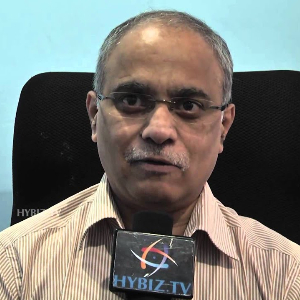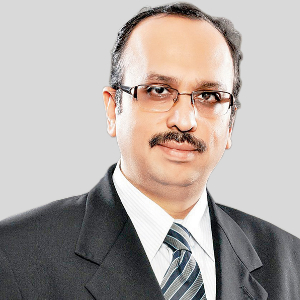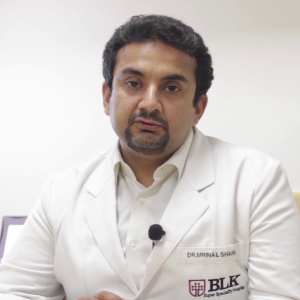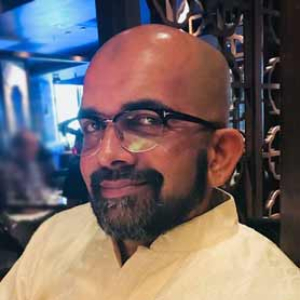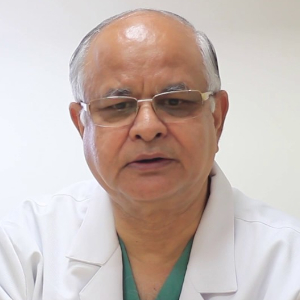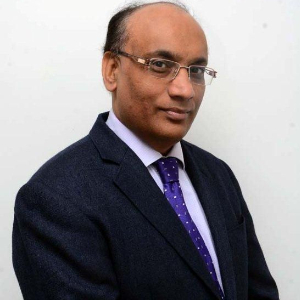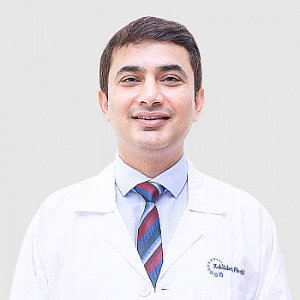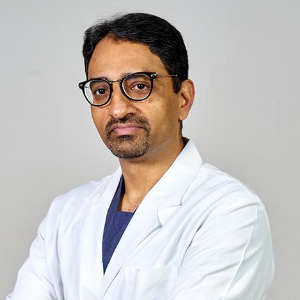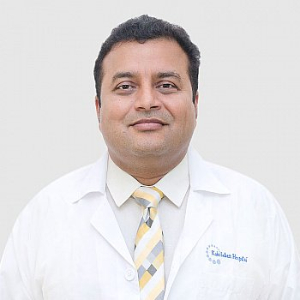Best Doctors in India for Birmingham Hip Resurfacing Surgery
- Orthopedic Surgeon, Hyderabad, India
- Over 30 years’ experience
Profile Highlights:
- Dr. J V S Vidya Sagar is a renowned Orthopedic Surgeon and one of the most experienced surgeons for Arthroscopy in India.
- Dr. Vidya Sagar has been performing Arthroscopic and Joint Replacement surgeries for over 30 years during which he has performed 31,500 Arthroscopies, 13,400 joint replacement surgeries, 27, 600 knee joint surgeries, and 20,800 surgeries for ligament reconstruction, and over 38,600 surgeries for cerebral palsy and polio.
- Orthopedic Surgeon, Mumbai, India
- Over 25 years’ experience
Profile Highlights:
- Dr. Kaushal Malhan is a renowned Orthopedic Surgeon in Mumbai with expertise in hip and knee replacement surgery and regional resurfacing.
- Dr. Kaushal Malhan’s name has been recorded in the Limca Book of Records for his innovative Tissue Preserving Total Knee Replacement Technique that helps in reducing post-operative recovery time.
- Dr. Malhan pioneered computer-assisted joint replacement surgery in India and is the first orthopedic surgeon to perform gender-specific computer-assisted and minimally invasive knee replacement.
- Orthopedic Surgeon, New Delhi, India
- Over 20 years’ experience
Profile Highlights:
- Dr. Mrinal Sharma is a highly renowned Orthopedic Surgeon and Joint Replacement Specialist with a specialization in Arthroplasty.
- Dr. Mrinal Sharma holds with him an experience of more than a decade and has achieved huge success with joint replacement procedures, especially of the knee, during his career.
- He is among the new generation of Orthopedic surgeons who use Computer Navigated techniques for performing knee and hip replacement surgeries.
- Orthopedic Surgeon, Mumbai, India
- Over 20 years’ experience
Profile Highlights:
- Dr. Murali Poduval is a well-known Orthopedic surgeon in Mumbai with a specialization in Joint Replacement surgeries.
- He holds an extensive experience of close to 2 decades in Orthopedics and Joint replacement surgery and is an expert in the management and treatment of deformity correction, arthroplasty, and complex trauma.
- He is highly skilled in performing all types of primary and revision surgeries on the hip, knee, and spine. His primary interest also includes hip arthroplasty for severe defects in children and adolescents.
- Orthopedic Surgeon & Spine Surgeon, New Delhi, India
- Over 40 years’ experience
Profile Highlights:
- Dr. Pradeep Sharma is the Director of the BLK-Max Centre for Orthopedics, Joint Reconstruction, and Spine Surgery in Delhi.
- Dr. Pradeep Sharma has an experience of 40+ years in the field and is an expert in the treatment of both adult and pediatric patients.
- Dr. Pradeep Sharma runs arthroplasty Fellowships supported by Zimmer and Stryker and has trained and mentored young surgeons in Arthroplasty.
- Orthopedic Surgeon, Kolkata, India
- Over 30 years’ experience
Profile Highlights:
- Dr. Rakesh Rajput is the Director and HOD – Orthopedics at The Calcutta Medical Research Institute (CMRI), Kolkata.
- Dr. Rakesh Rajput’s expertise lies in Joint replacement surgeries for the knee and hip, Arthroscopy, and Pelvic and Ace tabular trauma. He is also highly skilled in Minimally invasive orthopedic surgeries.
- Dr. Rakesh Rajput received his training in Joint replacement procedure from the prestigious University of Dundee and has worked and trained under some of the best orthopedic surgeons in the world.
- Orthopedic Surgeon & Spine Surgeon, Mumbai, India
- Over 25 years’ experience
Profile Highlights:
- Dr. Ram Chaddha is a specialist Spine Surgeon in Mumbai with expertise in the management and treatment of all kinds of spinal disorders for over 25 years.
- Dr. Chaddha is trained in Minimally Invasive Spine Surgery and is also among the few surgeons in India to hold expertise in Minimally Invasive Cosmetic Spine Surgery.
- Dr. Ram Chaddha spent a considerable number of years training undergraduate and postgraduate students and has also been an examiner for such courses at Mumbai University.
- Orthopedic Surgeon, Mumbai, India
- Over 24 years’ experience
Profile Highlights:
- Dr. Shreyash Gajjar is one of the most accomplished Arthroscopic and Sports Orthopedic surgeons in India and has performed more than 3000 surgeries of which more than 2500 included arthroscopic surgeries.
- Dr. Shreyash Gajjar is the first orthopedic surgeon in India to perform several first surgeries with the use of arthroscopic procedures.
- Dr. Shreyash Gajjar received his training in Arthroscopy, Trauma, and Sports Medicine from the best orthopedic institutions and under the guidance of renowned surgeons in India, UK, and Australia.
- Orthopedic Surgeon, Gurugram, India
- Over 20 years’ experience
Profile Highlights:
- Dr. Subhash Jangid is a renowned Orthopedic Surgeon in India who performs more than 600 joint replacement surgeries annually and helps in the management of patients after such procedures.
- He played a pioneering role in establishing the first Bone Bank in India at the All India Institute of Medical Science in 2002.
- He has been associated with several other prestigious hospitals both in India and abroad and has also been a Visiting faculty at Nnamdi Azikiwe University Teaching Hospital in Nigeria where he trains young surgeons in Arthroplasty.
- Orthopedic Surgeon and Spine Surgeon, Mumbai, India
- Over 20 years’ experience
Profile Highlights:
- Dr. Vishal Peshattiwar is a leading Spine Surgeon in Mumbai specializing in Minimally Invasive Spine Surgeries (MISS)
- He has an experience of more than 2 decades in spine surgery and holds the credit of performing over 4000 spinal surgeries to
- He is the first in India to use the MISS technique on a patient with liver failure and Tuberculosis.
- Dr. Vishal Peshattiwar’s most notable case till date was performing a Revision Spine Surgery through MISS on the oldest patient in India.
Best Hospitals in India for Birmingham Hip Resurfacing Surgery
Paras Hospital, Gurugram
- City: Gurugram, India
Hospital Highlights:
- Paras hospital was established in 2006 and is the 250 bedded flagship hospital of Paras Healthcare.
- The is supported by a team of doctors of international and national repute.
- The hospital is NABH accredited and also the first hospital in the region to have a NABL accredited laboratory.
- The hospital provides specialty medical services in around 55 departments including Neurosciences, Joint Replacement, Mother & Child Care, Minimal Invasive Surgery, Gynecology and Obstetrics, Ophthalmology, Dermatology, Endocrinology, Rheumatology, Cosmetic and Plastic surgery.
- The hospital is equipped with state-of-the-art technologies.
S L Raheja Hospital, Mahim, Mumbai
- City: Mumbai, India
Hospital Highlights:
- SL Raheja hospital is a 140-bed multi-specialty tertiary care hospital that is being managed by Fortis Healthcare Ltd.
- The hospital is a benchmark in healthcare and medical facilities in the neighborhood of Mahim & the western suburbs.
- L.Raheja Hospital, Mahim has one of the most effective ICU and Casualty care services.
- The hospital provides specialty medical services in Cardiology, Oncology, Neurology, Orthopedics, Mother & Child Care, and in Diabetes.
Wockhardt Hospitals, Mumbai
- City: Mumbai, India
Hospital Highlights:
- Wockhardt Hospitals were established in the year 1973, originally called First Hospitals and Heart Institute.
- Wockhardt Hospitals are super specialty health care networks in India, nurtured by Wockhardt Ltd, India’s 5th largest Pharmaceutical and Healthcare company.
- Wockhardt Hospitals is associated with Partners Harvard Medical International, an international arm of Harvard Medical School, USA.
- Wockhardt Heart Hospital performed India’s first endoscopic heart surgery.
- The hospital has a state-of-the-art infrastructure equipped with the latest technologies and modern equipment.
- It has special Centers of Excellence dedicated to the major specialties to provide hassle-free and high-quality clinical care.
Pushpawati Singhania Hospital & Research Institute, New Delhi
- City: New Delhi, India
Hospital Highlights:
- Established in 1996, Pushpawati Singhania Research Institute is one of the top hospitals in the NCR region, as well as one of the top facilities in India for gastroenterology. The hospital is one of South Asia’s first institutes in medical and surgical treatment for diseases related to digestion.
- The hospital is equipped with state-of-the art facilities coupled with the latest equipment as well as renowned consultants from various parts of India as well as other parts of the world.
Indian Spinal Injuries Center, New Delhi, India
- City: New Delhi, India
Hospital Highlights:
- The Indian Spinal Injuries Center (ISIC), provides state-of-the-art facilities for the management of all types of spinal ailments.
- Staffed with internationally trained, acclaimed, and dedicated spine surgeons, the hospital provides cutting-edge medical & surgical technology. The hospital provides comprehensive management of spinal injury, back pain, spinal deformities, tumors, osteoporosis, etc.
- The hospital performs motion-preserving spine surgeries including disc replacement and dynamic fixation, and minimally invasive spine surgeries such as endoscopic disc excision.
- The orthopedic service of the hospital covers all orthopedic ailments including trauma, joint diseases & replacements, oncology, pediatric orthopedics & upper limb ailment.
W Pratiksha Hospital, Gurgaon
- City: Gurugram, India
Hospital Highlights:
- W Pratiksha Hospital, Gurugram, is one of the best hospitals in the NCR region. It is also a top hospital in India for IVF. Since its inception, the hospital has performed over 5500 successful IVFs. The hospital also specializes in gynecology.
- With over 20 years of experience in providing quality healthcare, the hospital is known as one of the most trusted and valued health providers in India.
- Equipped with world-class medical facilities and advanced technology, the hospital’s doctors and clinicians also have a track record of delivering excellent results. The hospital is also known for focusing on preventive well-being as much as on curative treatment.
- The hospital has earned the trust of its patients, by providing the best available treatments at affordable costs.
Narayana Superspeciality Hospital, Gurugram
- City: Gurugram, India
Hospital Highlights:
- Situated near DLF Cyber City, Gurugram, Narayana Superspecialty Hospital is one of the top medical facilities in the Delhi NCR region, catering to the needs of the people. Known for its commitment to quality medical care and patient service, the hospital is a state-of-the-art facility with planned and well-equipped sections, which includes a spacious OPD area as well as comfortable patient rooms.
- It is the closest super-specialty hospital from Indira Gandhi International Airport towards Gurugram, and also the nearest super specialty hospital from DLF Cyber City. It is also close to major residential areas in Gurugram.
- It is part of the renowned Narayana Health Group. Established in 2000, by Dr. Devi Shetty, a renowned cardiac surgeon, it has grown to be one fo India’s leading healthcare groups.
Sir Ganga Ram Hospital, New Delhi
- City: New Delhi, India
Hospital Highlights:
- Sir Ganga Ram Hospital, New Delhi is known to provide the latest medical procedures with the latest technology in all of its units.
- The hospital has a team of reputed doctors, nurses, and healthcare professionals that ensure that patients receive quality care at affordable costs.
- Staffed with a team of highly qualified doctors, dedicated nurses, and paramedical and non-medical staff, the hospital aims to lead in healthcare delivery, medical education, training, and research.
- As per the vision of the founder, the hospital also provides free treatment to the economically weaker sections of society.
- Sir Ganga Ram Hospital also provides training to young doctors under the Diplomate in National Board(DNB) program. The DNB program at the hospital was started in 1984 and it is known for currently running the maximum number of DNB specialties in the country. It also has the distinction of having the first bone bank in India.
CK Birla Hospital, Gurugram
- City: Gurugram, India
Hospital Highlights:
- The CK Birla Hospital in Gurugram is a NABH-accredited multi-specialty hospital.
- The hospital strives to increase the quality of healthcare by focusing on UK NHS nurse and midwife training requirements. Policies and practices derived from the National Institute for Health and Treatment Excellence (NICE) recommendations in the United Kingdom ensuring that a strong focus on safety, high-quality clinical care, and sanitation is maintained.
- The hospital’s cutting-edge technology and facilities allow for real-time communication and seamless collaboration among caregivers, ensuring accuracy and the best possible results. Those with foreign experience and accreditations make up part of the hospital’s team of clinicians.
KIMS Hospital, Hyderabad
- City: Hyderabad, India
Hospital Highlights:
- KIMS Hospital (a brand name of Krishna Institute of Medical Sciences) is one of the largest and best multi-speciality hospitals in Hyderabad. The hospital provides various treatments to an enormous number of patients.
- The hospital has a capacity of more than 3000 beds. KIMS Hospitals offers different healthcare services in more than 25 specialities and super specialities.
- The hospital is equipped with modern medical equipment and technology. It has robotic equipment to provide minimal invasive techniques for patients.
- The hospital is aimed at providing world-class healthcare facilities and services at an affordable cost for patients.
- The various specialities and departments of the hospital include neurosciences, gastroenterology & hepatology, robotic science, reproductive sciences, dental science, oncological sciences, organ transplantation, heart and lung transplantation and mother and child care.
Birmingham Hip Resurfacing
The Birmingham Hip Resurfacing Surgery is a surgical procedure first introduced in the United Kingdom by manufacturer Smith & Nephew in 1997 and is currently implemented in over 26 countries as a medical alternative to Total Hip Replacement. The surgical procedure is recommended for patients who suffer from bad or worn out hip problems as the procedure aims to relieve intense hip pain and stiffness by ‘resurfacing’ a portion of the damaged hip bone.
What is Hip Resurfacing and how is it Different from Hip Replacement?
The Birmingham Hip Resurfacing surgery (BHR) is an alternative medical option to Total Hip Replacement (THR) where doctors place a mushroom-top cap over the head of the femur bone and another matching metal mushroom cap on the pelvis socket. Before the metal caps are inserted, a small part of the damaged bone is shaved or ‘resurfaced’. On movement of the hip bone, the joints produce a synovial fluid that acts as lubrication between the two metal surfaces and this pain from bone friction or stiffness is eliminated.
This procedure differs from the traditional hip replacement method where the entire hip joint is replaced completely leading to maximum bone loss, a situation that might not be favorable for younger patients. However, the hip resurfacing surgery needs to be done under an experienced medical team since it involves careful alignment of the metal caps in order to avoid future complications after the surgery.
When does a doctor recommend BHR?
Hip damage can be caused by different arthritis types such as osteoarthritis or rheumatoid arthritis, trauma etc. Conditions like bone tumour, avascular necrosis or dysplasia too can cause hip bone damage. Conditions like these affecting young patients can cause permanent hip bone damage but medical treatments like a total hip replacement surgery can prevent any possible future surgery options in young patients. Doctors hence recommends hip resurfacing surgery which preserves future surgical treatment options.
Birmingham Hip Resurfacing benefits
- The hip resurfacing surgery allows maximum bone conservation and is considered an apt medical treatment, especially for younger male patients ( less than 50-60 years old).
- The BHR success rate worldwide has been 90.2% to 98.6% making this medical procedure one of the most recommended treatment technique.
- Effect of the hip resurfacing surgery is known to last much longer than hip replacement method which makes it apt for long-term results.
- This medical procedure has the fastest recovery rate with documents revealing how some patients could go back to normal leg functioning within just 4 hours of the surgery. The usual time for complete recovery is 2-3 weeks within which the patient can go back to their normal life.
- This medical procedure also reduces hip dislocation complications significantly.
Common Diagnostic Tests Before Hip Resurfacing Surgery
Before recommending the surgery, your doctor or medical team might run a few clinical exams to diagnose the exact cause of the underlying condition and to determine whether hip resurfacing surgery is the best medical option for your condition or not. Usual tests may include physical tests or movement tests to determine the exact location or intensity of the pain. Doctors may ask about your medical history or possible bone or hip complication of the past and may ask for MRI or ECG results to determine whether the condition is merely related to the bones or does it have neurological complications involved. Doctors may also prescribe other necessary clinical exams if needed to understand the condition better.
Birmingham Hip Resurfacing Surgery Process
Preparation
There are no exclusive preparations needed for this procedure. Patients should inform the medical team of any past or present medical condition including intake of any daily medicine like antibiotics, blood thinners, pain killers, herbal or vitamin supplements, homeopathy doses, etc. You can ask your doctor for a detailed dietary chart to follow before the surgery. Doctors usually recommend no eating or consuming alcohol 12 to 10 hours before the surgery.
Procedure
The detailed procedure for this surgery may vary from patient to patient based on their surgical condition. Generally, an orthopaedic surgeon conducts the surgery with the help of a medical team and the entire procedure takes about 2-3 hours in total. This is a two-part surgery.
Step 1
Step 1 starts with the patient undergoing local or full anaesthesia to avoid any pain or discomfort during the procedure. The surgeon will then make a small incision in the patient’s thigh, preferably in the back to reveal the femoral bone once it’s been taken out of the hip joint socket. The top of the femoral bone is then trimmed or shaved with the help of surgical instruments and the doctor fits a metal cap over the head. This concludes the first part.
Step 2
Step 2 of the procedure starts with shaving or trimming the damaged bone or cartilage lining the pelvic socket before another metal cap is fitted into the socket. The surgeon now places the femoral bone back into the socket and aligns the metal-to-metal implant. The procedure ends with the surgeon closing the incision.
The Hip Resurfacing Surgery is Not Appropriate on these conditions:
- If the patient is pregnant
- If the patient’s bone health is weak or filled with multiple cavities
- If the patient has a kidney disorder
- If the patient is sensitive to metal
- If the patient is overweight or obese
- If the patient has chronic blood or bone infection
- If the patient has an immunity disorder due to diseases such as AIDS.
Risk Factors of Birmingham Hip Resurfacing Surgery
- Blood Clot
- Bone infection
- Bleeding Disorder
- Injured Nerves in and around the operation area
- Femoral fracture
Birmingham Hip Resurfacing Surgery Precaution & Care
Pain or soreness in the muscle or hip joint is normal after the surgery. The pain or soreness might be prominent near the incision area including chances of fluid leaking in and around the incision. While doctors prescribe pain medications for the soreness, fluids yellow or white in colour should be reported to the doctor immediately, especially, if the fluid draining is accompanied by redness or swelling. However, minimum fluid leakage is actually normal for this treatment.
There are no special diet regulations but it’s always better to check in with the medical team regarding diet to avoid interaction with medications prescribed. Based on your recovery rate, the medical team may ask for imaging scans or will advise you for physical therapy. A cane or a crutch for the initial recovery days might also be prescribed. Doctors will also determine when the patient can start applying pressure or go back to their normal lifestyle.
FAQs
How long do I have to stay in the hospital after a hip resurfacing surgery?
About 4-5 days hospital stay is needed.
How fast can I recover from the hip resurfacing surgery?
Usually, patients can start walking after 4 hours of the surgery, but that is completely based on the patient’s recovery rate. Doctors usually keep 2-4 weeks as the general recovery period.
Do I have to undergo hip resurfacing a second time?
Taking wear and tear into account, patients after 10-20 years might have to reappear for a resurfacing or total replacement surgery based on their condition.
Is this surgical procedure safe?
This surgery was approved by FDA in 2016 and so far 3000+ hip resurfacing surgeries with successful results have been performed.
Can I run after my hip resurfacing surgery?
Clinical documentations say running is possible after this surgery. However, long-term effects such as wear and tear are not calculated in this documentation. Your doctor will be able to guide you better on this.

